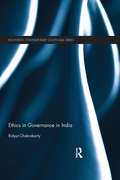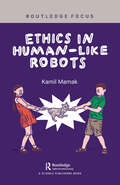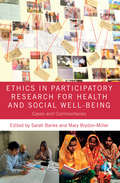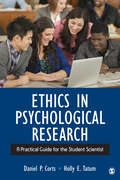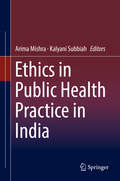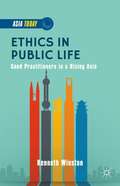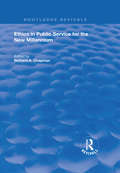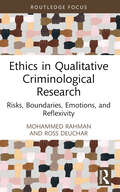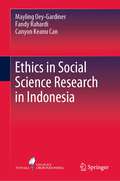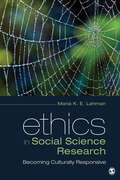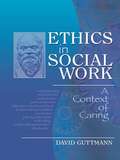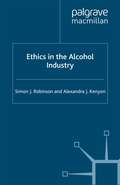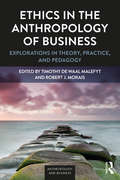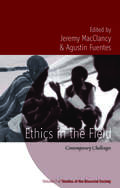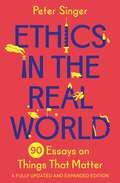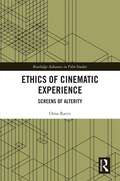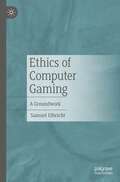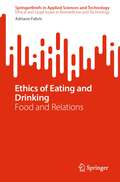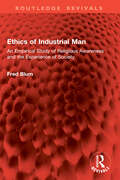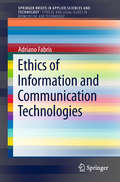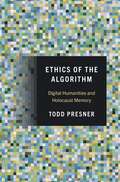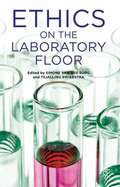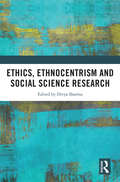- Table View
- List View
Ethics in Governance in India (Routledge Contemporary South Asia Series)
by Bidyut ChakrabartyGovernance and ethics are intertwined. A government functions within certain broad moral and ethical parameters, integrally linked with the sociological foundation of the polity in which it is articulated. The importance of ethics in governance has acquired a significant place in contemporary theoretical discussion. This book situates ethics in governance in India in the national frame and incorporates the context of globalization, allowing for the increasing importance of non-state global actors in national decision making. The author argues that a lack of ethics quickly turns into corruption and leads to governmental efforts to deal with it. He proposes that ethics are a set of standards that a society places on itself to articulate its responses to societal needs, and discusses the efforts of the Indian government at eradicating corruption and its failure. A theoretical approach to the issues of ethics in governance and corruption, this book is of interest to academics in the fields of Asian Politics, in particular Indian politics, and political philosophy.
Ethics in Human-like Robots
by Kamil MamakThe idea of creating artificial humans can be found at the beginning of the human culture. Ancient myths contain the stories of artificial humans brought to life by gods. The word robot originates from a play that was about artificial humans made from artificial flesh that aims to serve real humans. With advancements in robotics, the materialization of this idea is more real than ever before. We are witnessing attempts to create humanoid robots that might be deployed in many spheres of our life - policing, healthcare, and even for love and sex.The book focuses on the ethical issues of human likeness of robots and human tendency to anthropomorphize. It is built on the assumption that design choices are not neutral, and they need to be discussed to align robots with human values. With robots operating in the physical world, they bring ideas and risks that should be addressed before widespread deployment. The book reviews specific issues and provides suggestions and recommendations for improving robots to serve humans better. It draws on literature from Human-Robot Interactions, ethics of AI and robotics, and the philosophy of technology.
Ethics in Participatory Research for Health and Social Well-Being: Cases and Commentaries
by Mary Brydon-Miller Sarah BanksParticipatory research is well-established as an approach involving people with a direct interest in, or experience of, the issue being studied in carrying out research. However, it raises unique and challenging ethical issues. Traditional concerns with respect for the rights to confidentiality, consent, privacy and protection of ‘research informants’ do not translate easily into participatory research. Boundaries between researchers and those researched are often blurred; research trajectories may be emergent and unpredictable; and major ethical issues revolve around partnership, power, equality and respect for diverse knowledges. The book introduces the key ethical issues in participatory research, drawing on ethical theory and relevant literature before presenting seven substantive chapters, each on a different theme, such as power, ownership, confidentiality and boundaries. The chapters feature an introductory overview of the topic with reference to the literature, followed by four real-life case examples written by participatory researchers and short commentaries on each case. Drawn from around the world (from Denmark to Tanzania), the cases illustrate a range of ethical issues, outlining how they were handled and the reflections and feelings of the contributors. Focusing on developing ethical awareness, confidence and courage to act in ethically challenging situations in everyday research practice, this book is an invaluable resource for all participatory researchers.
Ethics in Psychological Research: A Practical Guide for the Student Scientist
by Daniel Paul Corts Holly E. TatumEthics in Psychological Research is a brief, practical guide for student researchers and their mentors to answer ethical questions and navigate issues of institutional policies and academic freedom. Authors Daniel P. Corts and Holly E. Tatum guide readers in identifying, preventing, mitigating, and resolving ethical issues in research using a unique ethical framework. Each of the standalone chapters provide real-life examples of ethical questions, a description of scholarly work on the matter, and suggestions for how to address similar problems should they arise in the researcher’s own work. The book makes for a succinct and easy-to-use reference for any student conducting research in the behavioral sciences.
Ethics in Psychological Research: A Practical Guide for the Student Scientist
by Daniel Paul Corts Holly E. TatumEthics in Psychological Research is a brief, practical guide for student researchers and their mentors to answer ethical questions and navigate issues of institutional policies and academic freedom. Authors Daniel P. Corts and Holly E. Tatum guide readers in identifying, preventing, mitigating, and resolving ethical issues in research using a unique ethical framework. Each of the standalone chapters provide real-life examples of ethical questions, a description of scholarly work on the matter, and suggestions for how to address similar problems should they arise in the researcher’s own work. The book makes for a succinct and easy-to-use reference for any student conducting research in the behavioral sciences.
Ethics in Public Health Practice in India
by Arima Mishra Kalyani SubbiahThis edited volume draws on ten original contributions that locate ethics at the centre-stage of public health practice. The essays explicate ethical issues, challenges, deliberations and resolutions covering a broad canvas of public health practice including policies, programmes, research, training and advocacy. The contributors are academics and practitioners in varying roles and long-standing engagement with public health in diverse settings within India. Their expertise in disciplines range from anthropology, sociology, health communications, gender studies, economics, epidemiology, social work and medicine. Their chapters deal with dimensions of ethical dilemmas that can rarely be defined and contained within ethical guidelines and protocols alone. Instead, they throw light on the associated factors, value systems and contexts in which such complexities occur and require response or redressal. This volume aims to articulate the growing awareness among practitioners that public health ethics is not merely an advanced grouping of possible problems and solutions. It hopes to facilitate robust platforms for dialogue and debate on the subject through the lenses of these contributions. The book is conceptualized to reach broader audiences such as public health practitioners and researchers in several roles within Government health systems, NGOs/Grass root organizations/CSR initiatives/advocacy groups; as well as researchers in academic settings and facilitators involved in teaching ethics and imparting training for students and young practitioners of public health.
Ethics in Public Life
by Kenneth WinstonThe topic of moral competence is generally neglected in the study of public management and policy, yet it is critical to any hope we might have for strengthening the quality of governance and professional practice. What does moral competence consist in? How is it developed and sustained? These questions are addressed in this book through close examination of selected practitioners in Asian countries making life-defining decisions in their work. The protagonists include a doctor in Singapore, a political activist in India, a mid-level bureaucrat in central Asia, a religious missionary in China, and a journalist in Cambodia--each struggling with ethical challenges that shed light on what it takes to act effectively and well in public life. Together they bear witness to the ideal of public service, exercising their personal gifts for the well-being of others and demonstrating that, even in difficult circumstances, the reflective practitioner can be a force for good.
Ethics in Public Service for the New Millennium
by Richard A. ChapmanThis title was first published in 2000: The focus of this analysis is that of moral standards in public service, with special attention to the role(s) of officials. It presents discussion of some of the issues that seem to the contributors to be of pressing importance and that seem to have relevance for public service in the new millennium. It concentrates in particular on public officials, and the constraints imposed on them by the political environment in liberal democracies.
Ethics in Qualitative Criminological Research: Risks, Boundaries, Emotions, and Reflexivity
by Ross Deuchar Mohammed RahmanProviding academic insights, reflections, and practical guidance on ethically conducting qualitative criminological research, this book emphasizes real-life examples to navigate research risks, boundaries, and emotions, while spotlighting reflexivity as a pivotal tool for qualitative inquiries, serving as an ethical compass throughout the research process.By engaging with this book, readers will be exposed to critical themes of managing risks, including physical harm and psychological trauma, navigating boundaries, dealing with the intense emotions that surface during research, and the importance of reflexivity in qualitative criminological research. The themes are illustrated through real-life examples that the authors have encountered during their fieldwork, using reflexive practices to highlight how they were able to ethically deal with unforeseen challenges. By presenting solutions, asking critical questions, and offering practical recommendations, the book guides readers on mitigating ethical issues, and provides a comprehensive approach to conducting research responsibly and ethically.Ethics in Qualitative Criminological Research will be useful for undergraduate and postgraduate students, academic researchers and practitioners with an interest in conducting research, and pracademics occupying both practitioner and academic roles.
Ethics in Social Science Research in Indonesia
by Mayling Oey-Gardiner Fandy Rahardi Canyon Keanu CanThis textbook presents ethical guidelines for conducting research in the social sciences, focused on Indonesia. As a country with a fast-growing research environment, the real-life cases of ethical issues that arise in Indonesia can teach both aspiring and established researchers how to approach the complexity of research ethics and dilemmas. With technological advancement affecting how research is conducted, the necessary ethical guidelines for research are also evolving. The instantaneous nature of information movement has made confidentiality in research data more critical than before, and any negligence in protecting research participants has an unprecedented scope of damage. The methods book synthesises hundreds of worldwide ethical guidelines and past issues that social science researchers will find highly relevant. Arranged chronologically to represent each research stage—from research preparation to post-research—the book prepares researchers to mitigate ethical crises. Relevant to all social scientists, both emerging and established, conducting research in Indonesia, this co-published textbook between Springer and OBOR is also relevant to researchers beyond the archipelago. It is also an indispensable teaching resource for lecturers in research methods and ethics across social science disciplines.
Ethics in Social Science Research: Becoming Culturally Responsive
by Maria K. LahmanEthics in Social Science Research: Becoming Culturally Responsive provides a thorough grounding in research ethics, along with examples of real-world ethical dilemmas in working with vulnerable populations. Author Maria K. E. Lahman aims to help qualitative research students design ethically and culturally responsive research with communities that may be very different from their own. Throughout, compelling first person accounts of ethics in human research—both historical and contemporary—are highlighted and each chapter includes vignettes written by the author and her collaborators about real qualitative research projects.
Ethics in Social Science Research: Becoming Culturally Responsive
by Maria K. LahmanEthics in Social Science Research: Becoming Culturally Responsive provides a thorough grounding in research ethics, along with examples of real-world ethical dilemmas in working with vulnerable populations. Author Maria K. E. Lahman aims to help qualitative research students design ethically and culturally responsive research with communities that may be very different from their own. Throughout, compelling first person accounts of ethics in human research—both historical and contemporary—are highlighted and each chapter includes vignettes written by the author and her collaborators about real qualitative research projects.
Ethics in Social Work: A Context of Caring
by David GuttmannProfessional knowledge doesn't guarantee you'll make the right decisions when it comes to professional ethics Ethics in Social Work introduces students, practitioners, and educators to theoretical and conceptual approaches to professional ethics and to the practice-related aspects of dealing with ethical problems and dilemmas. This unique book equips social workers with the ability to choose among different perspectives on the place and value of ethics in their approach to clients, and to use, defend, and explain their choices to clients, colleagues, supervisors, administrators, the general public, and the courts, if necessary. The book examines classical ethics, theories, and codes of ethics, virtues and values, etiquette, professional responsibilities, distributive justice, judiciary relationships, professional misconduct, and malpractice. A working knowledge of ethics is essential for the development of a healthy and happy relationship between service providers and consumers. Ethics in Social Work looks at how ethical issues and conflicts can affect the daily lives of social work practitioners and how an increased sensitivity to those issues can help enrich their professional experience. The book addresses the basic concepts relating to ethics, as well as theories, principles, rules and values that guide service provision based on the National Association of Social Workers Code of Ethics and Standards for Cultural Competence in social work practice.Ethics in Social Work examines:* the leading theories of ethics, including deontology and teleology* compromising or choosing between opposing values* professional etiquette in advertising and counseling* moral and professional responsibilities* the ethical dilemmas of telling the truth* social justice* practice-related aspects of distributive justice* fiduciary relationships* confidentiality in therapeutic work* resolving ethical dilemmas* the Hippocratic Oath and its relevance to social work* the Code of Ethics in social work* real-life cases of malpractice* and much moreEthics in Social Work includes case illustrations from existing literature and from professional experience, as well as an up-to-date bibliography. It is an essential read for anyone working, or preparing to work, in the helping professions.
Ethics in the Alcohol Industry
by Simon J. Robinson Alexandra J. KenyonA close look at the ethical and social responsibilities of the alcohol industry in the 21st Century. It begins with a whistle stop tour of the historical developments of alcohol. It then critiques the legislative and voluntary codes surrounding the advertising industry, popular culture, religious groups, Government and local authorities.
Ethics in the Anthropology of Business: Explorations in Theory, Practice, and Pedagogy
by Robert J Morais Timothy de Waal MalefytEthics in business is a major topic both in the social sciences and in business itself. Anthropologists, long attendant to the intersection of ethics and practice, are particularly well suited to offer vital insights on the subject. This timely collection considers a range of ethical issues in business through the examination of anthropologically informed theory and case examples. The meaning of ethical values, practices, and education are explored, as well as practical ways of implementing them, while the specific ethical challenges of industries such as advertising, market research, and design are considered. Contributions from anthropologists in business and academia promise a broad range of perspectives and add to the growing discussion on the ways anthropologists study, work, teach, and engage in a variety of industry settings. Engagingly written, Ethics in the Anthropology of Business will be of interest to a wide variety of audiences, including practicing anthropologists, current and future business leaders, and scholars and students from a range of social sciences.
Ethics in the Field
by Agustin Fuentes Jeremy MacclancyIn recent years ever-increasing concerns about ethical dimensions of fieldwork practice have forced anthropologists and other social scientists to radically reconsider the nature, process, and outcomes of fieldwork: what should we be doing, how, for whom, and to what end? In this volume, practitioners from across anthropological disciplines-social and biological anthropology and primatology-come together to question and compare the ethical regulation of fieldwork, what is common to their practices, and what is distinctive to each discipline. Contributors probe a rich variety of contemporary questions: the new, unique problems raised by conducting fieldwork online and via email; the potential dangers of primatological fieldwork for locals, primates, the environment, and the fieldworkers themselves; the problems of studying the military; and the role of ethical clearance for anthropologists involved in international health programs. The distinctive aim of this book is to develop of a transdisciplinary anthropology at the methodological, not theoretical, level.
Ethics in the Real World: 90 Essays on Things That Matter – A Fully Updated and Expanded Edition
by Peter SingerProvocative essays on real-world ethical questions from the world's most influential philosopherPeter Singer is often described as the world's most influential philosopher. He is also one of its most controversial. The author of important books such as Animal Liberation, Practical Ethics, Rethinking Life and Death, and The Life You Can Save, he helped launch the animal rights and effective altruism movements and contributed to the development of bioethics. Now, in Ethics in the Real World, Singer shows that he is also a master at dissecting important current events in a few hundred words.In this book of brief essays, he applies his controversial ways of thinking to issues like climate change, extreme poverty, animals, abortion, euthanasia, human genetic selection, sports doping, the sale of kidneys, the ethics of high-priced art, and ways of increasing happiness. Singer asks whether chimpanzees are people, smoking should be outlawed, or consensual sex between adult siblings should be decriminalized, and he reiterates his case against the idea that all human life is sacred, applying his arguments to some recent cases in the news. In addition, he explores, in an easily accessible form, some of the deepest philosophical questions, such as whether anything really matters and what is the value of the pale blue dot that is our planet. The collection also includes some more personal reflections, like Singer’s thoughts on one of his favorite activities, surfing, and an unusual suggestion for starting a family conversation over a holiday feast.Provocative and original, these essays will challenge—and possibly change—your beliefs about a wide range of real-world ethical questions.
Ethics of Cinematic Experience: Screens of Alterity (Routledge Advances in Film Studies)
by Orna RavivEthics of Cinematic Experience: Screens of Alterity deals with the relationship between cinema and ethics from a philosophical perspective, finding an intrinsic connection between film spectatorship and the possibility of being open to different modes of alterity. The book’s main thesis is that openness to otherness is already found in the basic structures of cinematic experience. Through a close examination of the ethical relevance of the philosophy of Maurice Merleau-Ponty, Stanley Cavell, Emmanuel Levinas and Gilles Deleuze to cinema studies, Ethics of Cinematic Experience: Screens of Alterity pursues the question of how film can open the viewer to what is not her, and so bring her to encounter otherness in a way that is unique to cinematic experience. The book sees ethics as not just the subject, content or story of a film but part of its aesthetic structure. Accompanied by readings of films mainly from mainstream cinema, each chapter focuses on a different aspect of the encounter with alterity through cinema. The book gives particular attention to how theoretical discussion of the cinematic close-up can lead to ethical insights into the status of both the human and the non-human in film, and thus lead to an understanding of the relationships the viewer makes with them. The book is a helpful resource for students and scholars interested in the relationship between philosophy, film and ethics, and is appropriate for students of philosophy and media and cultural studies.
Ethics of Computer Gaming: A Groundwork
by Samuel UlbrichtDespite the increasing number of gamers worldwide, the moral classification of computer gaming marks an as yet unsolved riddle of philosophical ethics. In view of the explosive nature of the topic in everyday life (as seen in various debates about rampages), it is obvious that a differentiated professional clarification of the phenomenon is needed: Can playing computer games be immoral?To answer this question, the author first discusses what we do at all when we play computer games: What kind of action are we talking about? The second step is a moral classification that reveals whether (and if so, why) some cases of computer gaming are morally problematic. The considerations made here provide a fundamental insight into the normative dimension of computer gaming. Samuel Ulbricht studied philosophy and German studies in Stuttgart, where he passed his first state examination. He completed his second state examination in Heidelberg. For his final thesis on the ethics of computer gaming, he received the "Prize of the Friends of the University of Stuttgart". His current research focuses on normative differences in moral theories, problem areas in applied ethics, the aesthetics and ethics of computer games and the ethics of education and teaching. He currently works at the Johannes Gutenberg University of Mainz.This book is a translation of the original German 1st edition Ethik des Computerspielens by Samuel Ulbricht, published by J.B. Metzler, an imprint of Springer-Verlag GmbH Germany, part of Springer Nature in 2020. The translation was done with the help of artificial intelligence (machine translation by the service DeepL.com). A subsequent human revision was done primarily in terms of content, so that the book will read stylistically differently from a conventional translation. Springer Nature works continuously to further the development of tools for the production of books and on the related technologies to support the authors.
Ethics of Eating and Drinking: Food and Relations (SpringerBriefs in Applied Sciences and Technology)
by Adriano FabrisThis book presents and discusses some of the problems that are increasingly emerging today in our relationship with food as well as in our style of eating and drinking. The first three chapters focuses on issues concerning eating, and on our relationship with what we can eat. The fourth chapter deals with the act of drinking, with our relationship with water, and discusses justice aspects in the use of water. The main idea is that the acts of eating and drinking are to be understood as relationships, i.e. as a way human beings relate to other beings. As such, they can be performed ethically well or badly. Therefore, an ethics of eating and of drinking should be developed. Not only the book highlights some key ethical problems associated with the act of eating and drinking, yet it also describes some ethically sustainable solutions to them. It ends with a list of reflections, which are intended to guide our choices in the relations with food and drinks with a normative approach. Mainly written for university students and researchers in the field of applied ethics, this book will also offer an inspiring reading to a wider audience of academics and professionals.
Ethics of Industrial Man: An Empirical Study of Religious Awareness and the Experience of Society (Routledge Revivals)
by Fred BlumHow do people actually experience God, Jesus Christ, the Kingdom and the Church? Does this experience affect their awareness of capitalism, socialism, competition, the relationship of markets to men, and their participation in politics? Does modern man have an ethical concern?First published in 1970, Ethics of Industrial Man explores the interrelationship between people’s experience of a deeper reality of life, their awareness of society and their participation in it. It is usually assumed that religion has lost its impact on the daily life of man. This is true, inasmuch as most people live their working lives divorced from religiously grounded ethics. But the author shows that it ceases to be true if we explore the significance of the universal ground in which all religious awareness and every social order is rooted. Using intensive interviews in Great Britain and the United States over a number of years, the author gives empirical evidence that the ethical impulse is not absent but is thwarted by the absence of bridges between the socio-economic sphere of life and people’s ethical awareness. Decisive in this connection is the confusion between what is universal and what is historically specific. This confusion, the author believes, underlies the apathy, the sense of powerlessness, the prevalence of a false consciousness, the decline of traditional religious forms. It is, he concludes, the core of the ethical corrosion of our time.
Ethics of Information and Communication Technologies (SpringerBriefs in Applied Sciences and Technology)
by Adriano FabrisThis book discusses key ethical and deontological problems concerning the use of the most common information and communication devices. It focuses on the challenges of the new environments we now find ourselves in thanks to these technologies, and the issues arising from the newly established relationship between the virtual sphere and the real world. Each aspect is analysed by starting from a very specific example or a case study presenting a dilemma that can only be resolved by making a reasoned ethical choice. Rather than thematically addressing only one of the many aspects mentioned above (for example, computer ethics or social network ethics), the book presents a comprehensive introduction to, and a co-ordinated overview of, the various deontological and ethical issues regarding the spread of the most common information and communication technologies.
Ethics of the Algorithm: Digital Humanities and Holocaust Memory
by Todd PresnerHow computational methods can expand how we see, read, and listen to Holocaust testimonyThe Holocaust is one of the most documented—and now digitized—events in human history. Institutions and archives hold hundreds of thousands of hours of audio and video testimony, composed of more than a billion words in dozens of languages, with millions of pieces of descriptive metadata. It would take several lifetimes to engage with these testimonies one at a time. Computational methods could be used to analyze an entire archive—but what are the ethical implications of &“listening&” to Holocaust testimonies by means of an algorithm? In this book, Todd Presner explores how the digital humanities can provide both new insights and humanizing perspectives for Holocaust memory and history.Presner suggests that it is possible to develop an &“ethics of the algorithm&” that mediates between the ethical demands of listening to individual testimonies and the interpretative possibilities of computational methods. He delves into thousands of testimonies and witness accounts, focusing on the analysis of trauma, language, voice, genre, and the archive itself. Tracing the affordances of digital tools that range from early, proto-computational approaches to more recent uses of automatic speech recognition and natural language processing, Presner introduces readers to what may be the ultimate expression of these methods: AI-driven testimonies that use machine learning to process responses to questions, offering a user experience that seems to replicate an actual conversation with a Holocaust survivor.With Ethics of the Algorithm, Presner presents a digital humanities argument for how big data models and computational methods can be used to preserve and perpetuate cultural memory.
Ethics on the Laboratory Floor
by Tsjalling Swierstra Simone van der BurgThis volume unites ethicists and social scientists to contribute to a new type of technology ethics. Cooperation with scientists makes it possible to anticipate ethical questions and problems at a stage when the technology can still be changed.
Ethics, Ethnocentrism and Social Science Research
by Divya SharmaThis book addresses the ethical and methodological issues that researchers face while conducting cross-cultural social research. With globalization and advanced means of communication and transportation, many researchers conduct research in cross-cultural, multicultural, and transnational settings. Through a range of case studies, and drawing on a range of disciplinary expertise, this book addresses the ethics, errors, and ethnocentrism of conducting law and crime related research in settings where power differences, as well as stereotypes, may come into play. Including chapters from scholars across cultures and settings – including Greece, Canada, Vienna, South Africa, India, and the United States – this book provides an invaluable survey of the issues attending cross-cultural social justice research today. Engaging issues confronted by all cross-cultural researchers this book will be invaluable to those working across the social sciences as well as professionals in criminal justice and social work.
